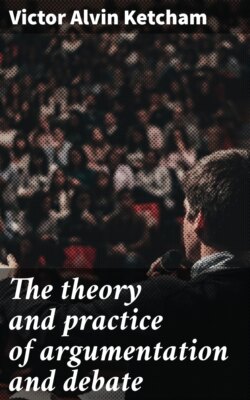Читать книгу The theory and practice of argumentation and debate - Victor Alvin Ketcham - Страница 53
На сайте Литреса книга снята с продажи.
4. The selection of evidence must be fair and reasonable.
ОглавлениеAn advocate of any cause, public or private, must have as a basis for his argument a genuine regard for right and justice. Therefore he is bound to exercise due care in making sure that the selection of evidence is fair and reasonable. No one who argues can gain any permanent advantage from the use of unfair methods. In using quotations from authority be sure that the words used indicate exactly the position of that authority. By skillful omissions a reputable authority may be made to defend almost any position. In the use of statistics the temptation to juggle is sometimes strong. Statistics, by skillful combinations and omissions, can be made to prove an absolute lie. In discussing the income from a kind of state tax which is utilized in all the most important states in the Union, the student who selected the states of Nevada, South Dakota, and Rhode Island to show that the income derived from the tax was a substantial source of revenue, must have succeeded only in proving to his audience that he had had great difficulty in finding states in which the tax had proved to be a success. Had he been able to produce statistics to show that Massachusetts, New York, Pennsylvania, Ohio, Illinois and other large and populous states were using his form of taxation with success, his chance of persuading his hearers would have been incalculably increased.
Not only must evidence be fairly selected but it must be reasonable as well. No statement which is contrary to the usual experience of the individuals addressed should be made unless it is based upon indisputable authority. Facts outside the pale of usual human experience are always regarded with distrust. Abnormal conditions, such as the existence of unusual misery or vice among certain classes, oppression, glaring social, industrial, or political evils, must always be kept within the bounds of possibility and based upon reliable authority. The temptation is often strong to cite instances on account of their sensational character and the probable striking effect upon the audience or readers. Such material is sometimes very important, but if it even approaches the border of impossibility it should be fortified by the strongest evidence.
The value of certain evidence may be greatly increased if it can be shown to be reasonable. If surrounding circumstances can be introduced to show that the evidence is either cause or effect and therefore something naturally to be expected under the conditions stated, it will be accepted almost without question. All evidence should be carefully considered from the two standpoints of fairness and reasonableness. To offer unfair evidence is dishonorable. It is the method of the swindler and the trickster. It is especially reprehensible in the student of argumentation, whose first duty is to uphold the truth.
